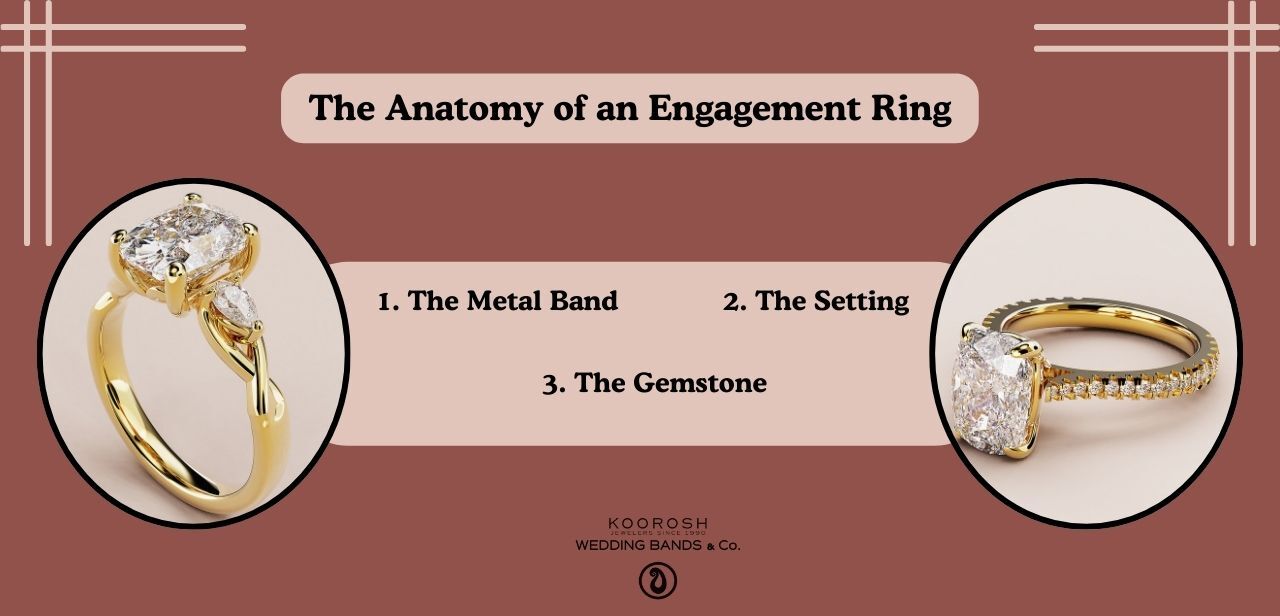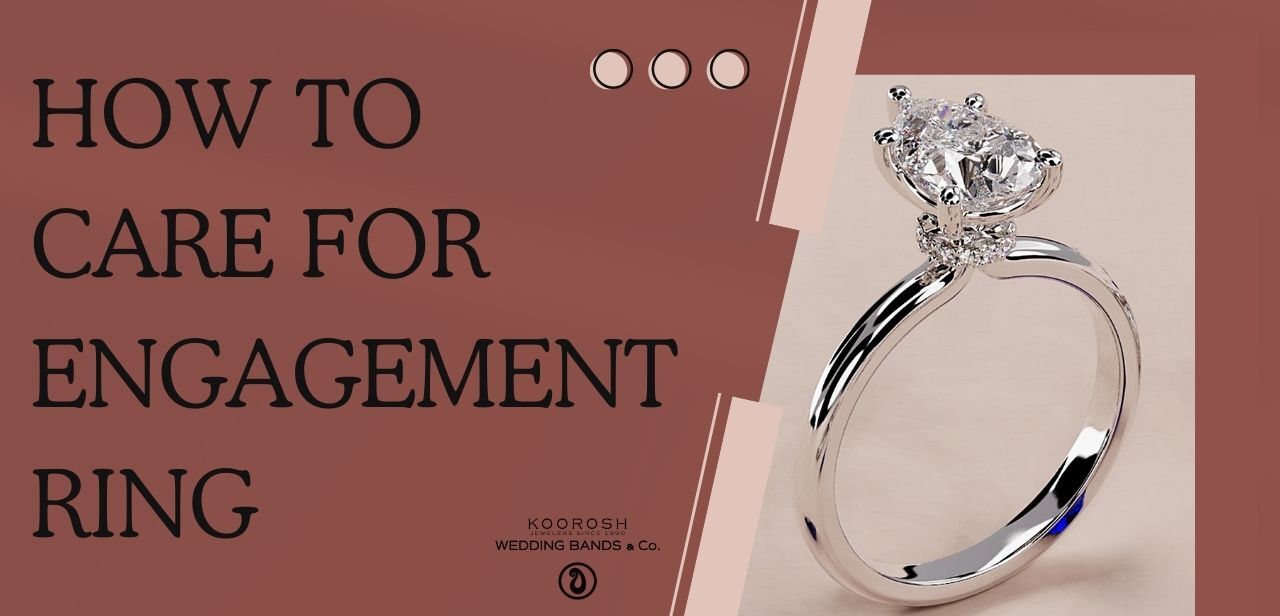Can Engagement Rings Get Wet?
Posted by Koorosh Daneshgar on Feb 1st 2023

Can Engagement Rings Get Wet?
An engagement ring is not just a piece of jewelry, it is a symbol of love, commitment and the beginning of a happy life. Since the ring holds a lot of meaning and is expensive as well, it is crucial to know how to take care of your ring. One of the most common questions that people who have just gotten engaged ask is: Can engagement rings get wet?
The answer to this question is yes, but there are some consequences that come with it. Water can cause different reactions to different parts of the ring depending on the material used. In this guide, we’ll break down:
- The types of engagement ring and how water affects each of them
- The effects of water on the various metals and stones used in the orchid
- Steps to prevent your engagement ring from being damaged
- How to get professional engagement ring care and custom jewelry services in Chicago
Whether you are in search of an engagement ring in Chicago or you are simply looking for information on how to take care of your ring, this article will be of great help to you.
The Anatomy of an Engagement Ring
In order to establish whether your engagement ring can be exposed to water or not, it is necessary to understand the various components of the ring.

1. The Metal Band
The band or shank is the part of the ring that hugs the finger. Each of the metals present their own advantages and disadvantages when it comes to water exposure:
- Gold (Yellow, White, Rose) – Gold is a relatively soft metal that may undergo some degradation with prolonged contact to water especially if the water is chlorinated or salty.
- Platinum – This metal is more robust than gold and does not easily tarnish but it can still gather some residues from soaps and chemicals.
- Sterling Silver – Since silver is a metal it has its own set of problems; it oxidizes which can lead to the formation of a black or blue residue on the ring when it comes into contact with water.
- Titanium & Tungsten – These metals are water-proof and very strong and are therefore suitable for people with an active lifestyle.
2. The Setting
The manner in which the gemstone is held in place in the ring determines how water affects it.
- Prong Setting – This common design exposes the gemstone to a higher risk of coming into contact with water and dirt. Water and debris can collect underneath the stone and would need to be cleaned regularly.
- Bezel Setting – This type of setting where the metal forms a circle around the gemstone is less likely to allow water to reach the gemstone as there is less chance of water settling on the top of the metal.
- Pavé or Halo Setting – Pavé or halo setting can trap moisture and dirt in the small diamonds surrounding the main stone.
3. The Gemstone
Not all gemstones are created to be immune to water.
- Diamonds – Diamonds are not porous but they are prone to sticking up oils and other residues from water and thus they will become dull.
- Sapphires & Rubies – These gemstones are not easily affected by water and can be used without much concern.
- Opals & Pearls – These gemstones are very porous and thus absorb water and may get damaged permanently.
Can Your Engagement Ring Be Damaged by Water?
One more thing, while frequent contact with water and other detergents is not very dangerous, using soaps, chlorine and salt water can be dangerous for your ring in the long run. Here’s how:
Tarnishing & Discoloration – Some of the metals like silver and white gold are more prone to tarnishing especially when exposed to water.
Weakened Prongs & Settings – Water and other chemicals in the environment can erode the prongs which would otherwise hold the gemstone in place.
Buildup of Residue – Lotion, soap, and minerals from hard water can cause your ring to lose its luster and may need to be cleaned by a professional.
Gemstone Damage – Some gemstones including emerald, opal, and pearl should not be worn when swimming because they can easily break or change their color.
When to Take Off Your Engagement Ring
To avoid damaging your ring, it is recommended that you do not wear it when:
Showering & Washing Hands – Soaps and shampoos leave a residue on the skin and hot water can cause some metals to lose their strength over time.
Swimming – Chlorine in the swimming pools and salt in the sea water can lead to a chemical reaction with the metal of your ring. Also, the cold water makes the fingers contract and this increases the chances of losing the ring.
Working Out – It can create a build up of moisture and sweat, especially under settings, which can cause rings to appear dull.
Cleaning with Chemicals – Many common household products have strong chemicals like bleach and ammonia that can damage the metal and the gemstones.

Learn How to Care for Your Engagement Ring like a Pro
To ensure that your engagement ring always looks as good as new, follow these care tips:
Clean Your Ring Regularly – To clean your ring, use a soft toothbrush and soap or soap substitute. Do not use ultrasonic cleaners for gemstones that are known to be sensitive.
Store It Properly – When you are not wearing your ring, it is recommended to put it in a dry jewelry box to avoid contact with moisture and dust.
Get Professional Cleanings – Have your ring examined and cleaned by a professional jeweler in Chicago at least once a year.
Use a Ring Dish – This will help to ensure that your ring is safely placed in water when washing your hands, in a small dish.
Where to Get Custom Engagement Rings and Jewelry Services in Chicago
If you are in search of a custom engagement ring in Chicago or you require professional assistance in handling your jewelry, then you should visit a professional jeweler. We specialize in:
- Engagement rings that are made to order for you
- Ring resizing & repairs to ensure that your ring stays in the best condition
- Professional cleaning services to bring back the shine of your jewelry
- Wedding bands and other exquisite jewellery pieces

Visit Our Chicago Showroom
Address: 43 E Oak St, FL 2, Chicago, IL 60611
Call: +13129200726
Email: info@weddingbandscompany.com
Final Thoughts: Can Your Engagement Ring Get Wet?
Yes, your engagement ring can get wet but you should avoid putting it in water as often as possible and also avoid putting it in chemicals and extreme conditions. It is therefore advisable to take the following factors into consideration when determining the best approach to take concerning the care of your ring.
To learn more about custom engagement rings in Chicago or to get some expert advice on how to care for your ring, please schedule a consultation and let us help you create and preserve the best ring for your relationship.

By: Koorosh Daneshgar CEO/Design Chief
We'll help you to design your dream engagement ring without stress and spending countless hours searching for your perfect ring. All you need to do is click on "Free Consultation" to get started.

